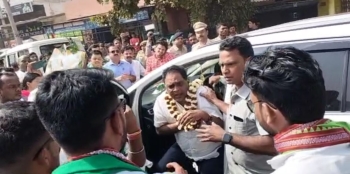
.png) Aarti
Aarti

It is shocking that Odisha’s richest senior Biju Janata Dal leader-cum-Health and Family Welfare Minister Naba Kishore Das was fatally shot at from point-blank range by an on-duty policeman at Brajrajnagar in Jharsuguda District. The incident that occurred on 29 January in broad day light clearly exposes the horrifying breach of VVIP security procedure.
Mr Naba, elected thrice to Odisha Assembly, owned business in mining transport sector. Known for his organisational skills in political circles, he was on the way to address a public meeting when the incident took place. Soon after the Minister got down from his vehicle after opening the front side passenger door, the 54-year-old assistant sub inspector Gopal Krushna Das who was deployed for traffic clearance came close, opened fire at him from his service pistol from a very close range. Despite being airlifted to Bhubaneshwar immediately and treatment initiated, the injuries arising out of the single bullet that damaged the 60-year-old minister's heart as well his left lung which resulted in massive internal bleeding and he couldn’t be revived.
The alleged killer cop, Gopal, a decorated police officer having won 18 medals besides cash awards eight times in his career has since been dismissed from service. While the ongoing investigation by the Crime Branch is expected to unravel the motive behind the killing, according to some reports, as claimed by Gopal’s wife, the policeman is stated to be suffering from mental illness. The psychiatrist who treated Gopal has also reportedly indicated that he was afflicted by bipolar disorder, a mental health condition that causes extreme mood swings.
Undoubtedly, police duties are considered to be the toughest but it is challenging to know what goes on in the mind of a policeman when he resorts to sudden firing. Last November, in Jharkhand’s Palamu, a policeman was arrested and his service revolver seized for unprovoked firing at two civilians, who miraculously escaped with minor injuries. He was believed to be in an inebriated condition when he fired the two shots. There have been several instances where the men in khaki have shot at their seniors for not permitting to go on leave or such other reasons.
Not long ago a national online survey of 10,000 police officers and staff was undertaken to understand the mental health issues within the police force in the United Kingdom. It found that many of them suffered from invisible psychological injuries and it highlighted various mental issues such as anxiety, depression, etc., as a major concern. It was found that officers and staff were twice likely to need time off for a mental health injury than for a physical injury. Notably, the respondents who experienced psychological injury were less satisfied with the support that they were offered than were those with physical injuries. Following the survey, £3 million was made available over three years to help the police address identified gaps in provision and support those who suffer psychological harm as a result of their policing role.
A study done in Lucknow on the psychological well-being of traffic police personnel found that the conditions in which they work was not only stressful but also uncomfortable with long working hours, often in standing positions. Nearly 48 percent of the respondents said they worked for 10 to 12 hours a day and 25 percent for more than 12 hours a day.
So, not getting enough sleep can lead to many negative outcomes adversely affecting work and life. It can increase stress levels, decrease one’s decision-making ability besides leading to a negative attitude, both at work and home. Hence there is need for work-life-balance. At an organisational level, there is an imperative need to be absolutely vigilant and put in place fool proof systems in respect of VVIP security.
Prime Minister Narendra Modi at the recently held 57th All India Conference of Director Generals/Inspector Generals of Police suggested for making the police force more sensitive and train them in emerging technologies and data exchange across agencies. He also underscored the need for repealing obsolete criminal laws and building standards for police organisations across states besides further leveraging technological solutions like biometrics and the need to further strengthen traditional policing mechanisms like foot patrols. Hopefully, translating them into meaningful actions and side-by-side ushering in the much-needed police reforms can go a long way in mutually benefiting the police as well as the citizens.